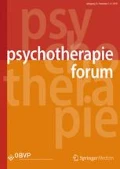Abstract
Since the Decade "Peace Is In Our Hands" has been proposed by the UNESCO, the occurrence of Peace Camps all over the world is increasing. Yet only few of these were accompanied by research. The objective of our study was to explore a Peace Camp's impact on possible changes of prejudices and social attitudes among and within different ethnic groups. By using questionnaires, an empirical longitudinal survey on social attitudes was conducted at a total of three given times (34 camp participants and 83 controls). The ten-day Peace Camp in Rechberg, Carinthia, 2005 was attended by male and female teenagers from three different countries; in total, four different (ethnic) groups with Austrian, Slovenian, Arab Israeli and Jewish Israeli backgrounds. Strengthening of self-esteem along with a reduction of negative prejudices was the major impact of the Peace Camp. However, the different ethnic groups showed significant distinctions in development. Peace Camps represent a valuable means for peace education. The results from Peace Camps should be reviewed much more than before, so that the findings can be better used for future camps.
Zusammenfassung
Seit der Ausrufung der Dekade "Peace Is In Our Hands" durch die UNESCO finden weltweit vermehrt Peace Camps statt. Wenige davon werden wissenschaftlich begleitet. Ziel unserer Studie war, die Wirkung eines Peace Camps im Hinblick auf die Veränderung von Vorurteilen und Einstellungen verschiedener ethnischer Gruppen zu untersuchen. Mit Hilfe einer Fragebogenbatterie wurde eine empirische Längsschnittuntersuchung bezüglich sozialer Einstellungen zu zwei oder drei Zeitpunkten durchgeführt (N = 117; 34 Campteilnehmer, 83 Mitschüler der Campteilnehmer als Kontrolle). An dem Peace Camp, das 2005 in Rechberg, Kärnten, an zehn Tagen stattfand, nahmen männliche und weibliche Jugendliche aus drei Ländern teil. Es waren insgesamt vier Gruppen, bestehend aus Österreichern, Slowenen, arabischen und jüdischen Israelis. Der Haupteffekt des Peace Camps lag in der Stärkung des Selbstwertes, der mit einer Reduktion der negativen Vorurteile einherging. Die einzelnen Ethnien zeigten dabei einen erheblichen Unterschied in der Entwicklung. Schlussfolgerungen: Peace Camps sind ein wertvolles Instrument der Erziehung zum Frieden. Ihre Ergebnisse sollten weit mehr als bisher überprüft werden, um die Erkenntnisse in nachfolgenden Camps besser einbringen zu können.
Similar content being viewed by others
Literatur
Allport GW (1954) The nature of prejudice. Addison-Wesley, Reading, Mass
Brosius F (2006) SPSS14. mitp, Heidelberg
Field A (2005) Discovering statistics using SPSS. Sage Publications, London
Johnson DW, Johnson RT (2000) The three Cs of reducing prejudice and discrimination. In: Oskamp S (Hrsg) Reducing prejudice and discrimination: social psychological perspectives. Erlbaum, Mahwah, NJ, S 239–268
Kropiunigg U (2002) Teamshaping in medical teaching: changing groups to teams. Medical Teacher 24: 649–651
Kropiunigg U, Madu SN, Barth A (2006) Tabuthemen in der Adoleszenz. Psychotherapie Forum 14: 165–171
Madu S, Kropiunigg U, Weckenmann M (2002) Health complaints of high school students in the Northern Province and taboo themes in their families. South African Journal of Education 22: 65–69
Pettigrew TF (1998) Intergroup contact theory. Annual Review of Psychology 49: 65–85
Pettigrew TF, Tropp LR (2006) A meta-analytic test of intergroup contact theory. Journal of Personality and Social Psychology 90: 751–783
Plant EA, Devine PG (1998) Internal and external motivation to respond without prejudice. Journal of Personality and Social Psychology 75: 811–832
Ray JJ, Lovejoy FH (1988) An improved directiveness scale. Australian Journal of Psychology 40: 299–302
Thomas A, Chang C (2007) Erlebnisse, die verändern. Vandenhoeck und Ruprecht, Göttingen
Saucier G (2000) Isms and the structure of social attitudes. Journal of Personality and Social Psychology 78: 366–385
UNESCO (2001–2010) Peace Is In Our Hands. http://www3.unesco.org/iycp/, besucht am 28. 3. 2007
UNESCO (2002b) Mainstreaming the culture of peace. Broschüre online unter http://www3.unesco.org/iycp/uk/uk_sum_unescoactivities.htm, besucht am 28. 3. 2007
Wittenberg R (1998) Computerunterstützte Datenanalyse. Lucius und Lucius, Stuttgart
Author information
Authors and Affiliations
Corresponding author
About this article
Cite this article
Kropiunigg, U., Pabst, B. Selbstwertsteigerung und Vorurteilsreduktion bei Jugendlichen eines multiethnischen Peace Camps. Psychotherapie Forum 15, 63–72 (2007). https://doi.org/10.1007/s00729-007-0194-1
Issue Date:
DOI: https://doi.org/10.1007/s00729-007-0194-1




